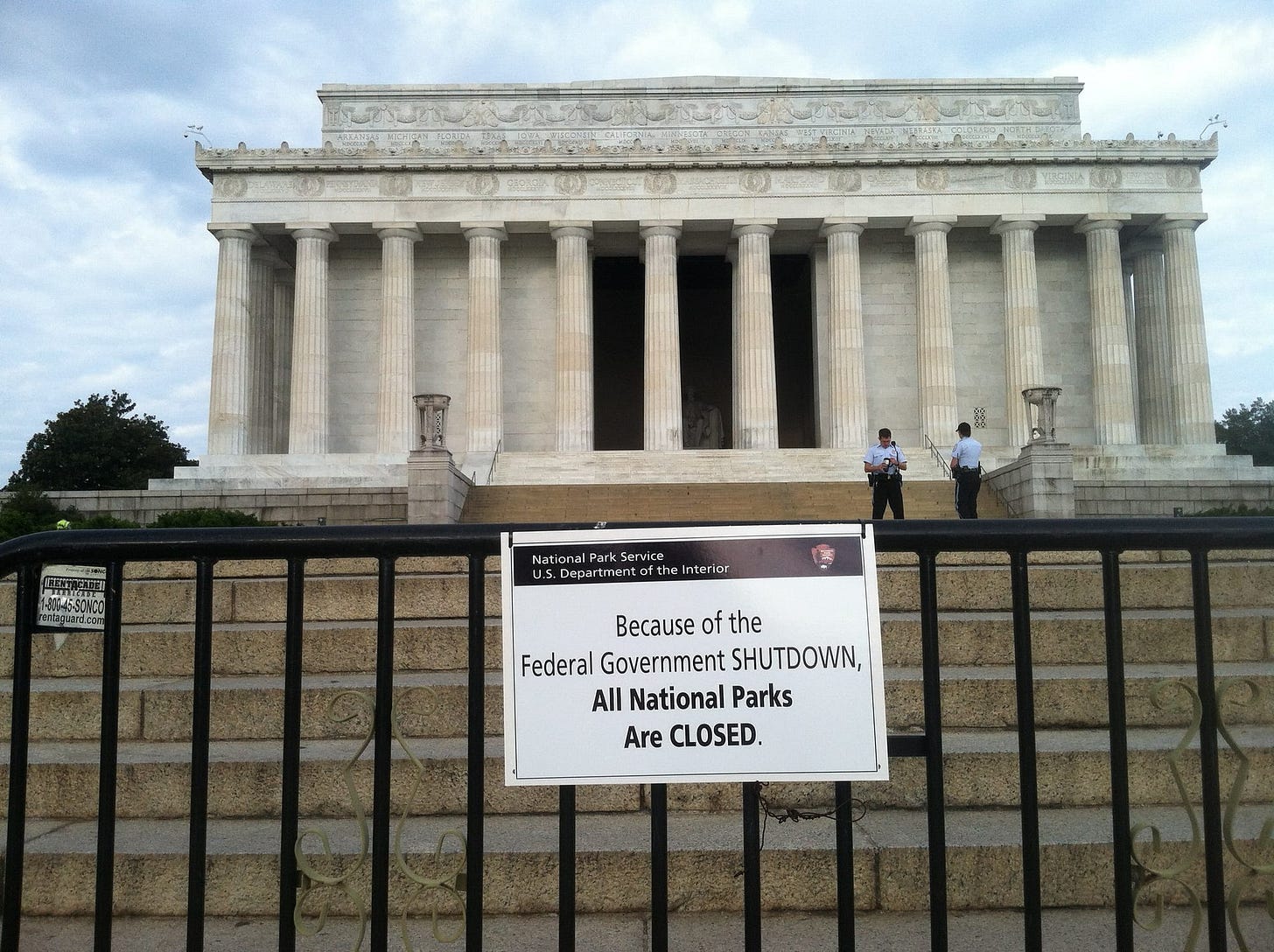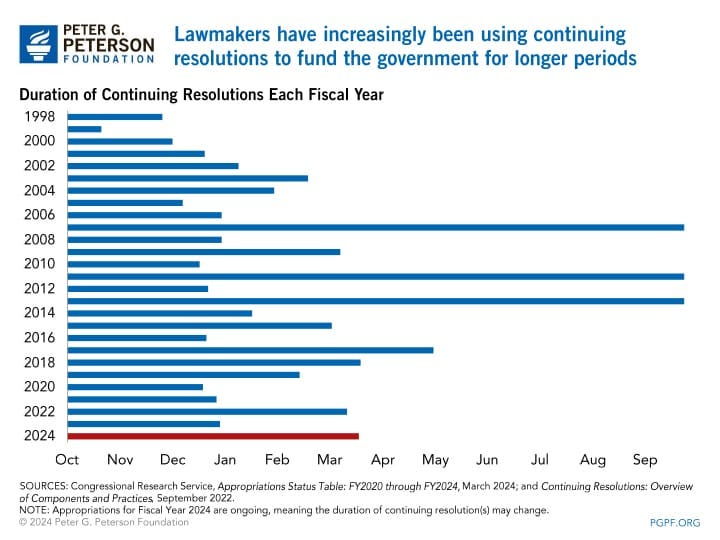Good morning! It’s Monday, March 18, 2024. Election Day is 232 days away. If this newsletter was forwarded to you, subscribe here. If you want to contribute to support my work, donate here.
The theme of government funding this year has been “functional dysfunction,” as Carl Hulse put it recently in The New York Times.
“Functional” because lawmakers have managed to avert every shutdown deadline put in front of them, either by passing continuing resolutions (CRs) or a six-bill “minibus” along bipartisan lines.
But “dysfunction” because we are more than five months into the 2024 fiscal year, and lawmakers still haven’t reached an agreement on the other six appropriations bills.
Those remaining bills — covering the Departments of State, Defense, Treasury, Homeland Security, Labor, and Health and Human Services — represent about three-fourths of discretionary government spending. These agencies are all set to shut down at the end of the day on Friday if an agreement isn’t reached by then.
According to Punchbowl News, many of the snags in this second six-bill package have been resolved, including a dispute over U.S. aid to Palestinians. (The two parties have agreed to route the aid through organizations besides the United Nations Relief and Works Agency, following Israeli allegations that UNRWA employees participated in the October 7th attacks.)
The main hold-up now is over funding the Department of Homeland Security. Per Roll Call, because the DHS spending talks had become so mired in disagreements over immigration and border security, lawmakers were planning to pass a months-long CR holding DHS funding steady for the rest of the fiscal year, which would have been attached with five full appropriations bills for the other remaining spending categories.
However, the White House intervened at the last minute and refused to settle for a DHS CR, demanding in increase in border security funding. Appropriators have now returned to the negotiating table, frantically working to find a bipartisan agreement on DHS funding.
If recent history is any guide, they will find one. (Indeed, lawmakers are optimistic about inking a deal as early as today.) As Hulse wrote in The Times, government funding fights have lately devolved into a familiar show of “congressional theater,” with lawmakers repeatedly coming to the brink of shutdown — before averting one every time. “It’s a dynamic that is keeping the government’s lights on — but doing little else so far,” Hulse wrote.
It’s worth noting that, while funding deadlines often receive excessive hype, the government has yet to shut down in the Biden era. The last government shutdown was in January 2019, more than five years ago.
Of course, that doesn’t mean the status quo we’ve settled on is perfect. Lawmakers are taking longer and longer to agree on government funding. “From 1998 through 2010, nearly one-third of the fiscal year, on average, was funded by a CR rather than through full-year appropriations,” the Peter G. Peterson Foundation reports. “From 2011 through 2023, temporary measures accounted for an even larger share — 45 percent — of the year.” We are currently at around the 46% mark.
Continuing resolutions keep the government’s lights on, but they can lead to inefficiencies and increased costs compared to full appropriations bills.
Still, the four CRs approved this year are far from a record. That dubious honor goes to Fiscal Year 2001, when President Bill Clinton insisted that he would only sign one-day CRs, forcing Congress to approve 21 stopgap measures in a row before reaching a full appropriations deal. Lawmakers had to come in every day — even Saturday and Sunday — to pass the CRs, but a shutdown was successfully averted.
Talk about “functional dysfunction.”
More news to know.
Ex-vice president Mike Pence is refusing to support his former running mate this year. “I cannot endorse the agenda that Donald Trump is carrying into this national debate,” he said on CBS News this weekend.
At a Saturday rally in Ohio, Trump was warning that U.S. car manufacturing would deplete if he isn’t returned to the White House, when he said: “Now, if I don’t get elected, it’s going to be a bloodbath for the whole — that’s gonna be the least of it. It’s going to be a bloodbath for the country.” The Biden campaign has said that Trump’s use of the word “bloodbath” suggests that he “wants another January 6,” while the Trump campaign has insisted that Trump was referring only to problems for the auto industry.
Less ambiguous was Trump’s standing and saluting for an alternate rendition of the national anthem performed by January 6th prisoners or his rhetoric about immigrants. In other news, Trump is reportedly “determined” to hire Paul Manafort (the former aide who he pardoned after tax and bank fraud convictions) back onto his campaign.
President Biden is growing “angry and anxious” about his re-election effort behind the scenes, NBC News reports. In public, though, he’s continuing to project calm, boasting about his fundraising haul and cracking jokes at the Gridrion Dinner.
Russian president Vladimir Putin was easily elected to an unprecedented fifth term on Sunday, extending his rule for another six years through an undemocratic balloting process. (Even without many choices on the ballot, thousands of protesters registered their discontent by showing up to vote at the same time through the “Noon against Putin” campaign.)
Israeli prime minister Benjamin Netanyahu is pushing back against Senate Majority Leader Chuck Schumer’s call for new elections in Israel. “We’re not a banana republic,” Netanyahu said on CNN, bashing Schumer’s speech as “totally inappropriate.”
The U.S. and Iran held secret talks in January as tensions escalated, with the two delegations sitting in separate rooms and Omani mediators shuttling messages back and forth.
More headlines:
Democrats’ big vulnerability: Why they’re losing Black, Hispanic voters (Axios)
Grocery Prices Have Soared. That’s Spoiling Biden’s Economic Pitch. (Bloomberg)
Hal Malchow Is Going to Die on Thursday. He Has One Last Message for Democrats. (Politico Magazine)
The day ahead.
White House: President Biden and Vice President Harris will deliver remarks at a Women’s History Month reception.
Congress: The House and Senate are out until tomorrow.
Supreme Court: The justices will hear oral arguments in Murthy v. Missouri, a suit brought by Republican-led states claiming that federal officials violated the First Amendment in their communications with social media companies about content moderation policies.
The justices will also hear another First Amendment case: NRA v. Vullo, in which the National Rifle Association is alleging that a New York official violated the group’s freedom of speech by urging banks and insurance companies to cut ties with the gun rights organization.
Thanks for reading.
I get up each morning to write Wake Up To Politics because I’m committed to offering an independent and reliable news source that helps you navigate our political system and understand what’s going on in government.
The newsletter is completely free and ad-free — but if you appreciate the work that goes into it, here’s how you can help:
Donate to support my work or set up a recurring donation (akin to a regular subscription to another news outlet).
Buy some WUTP merchandise to show off your support (and score a cool mug or hoodie in the process!)
Tell your family, friends, and colleagues to sign up at wakeuptopolitics.com. Every forward helps!
If you have any questions or feedback, feel free to email me: my inbox is always open.
Thanks so much for waking up to politics! Have a great day.
— Gabe






